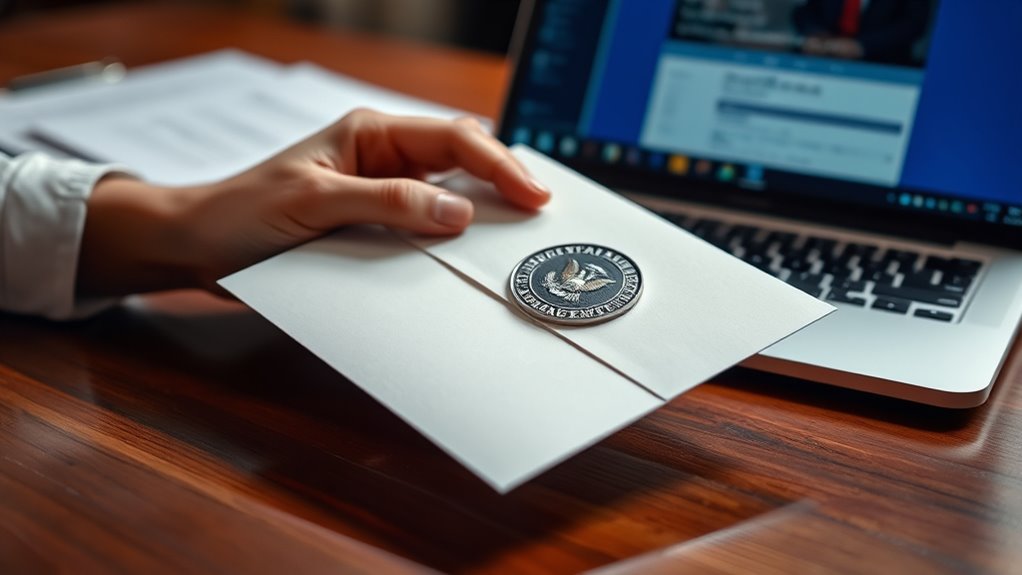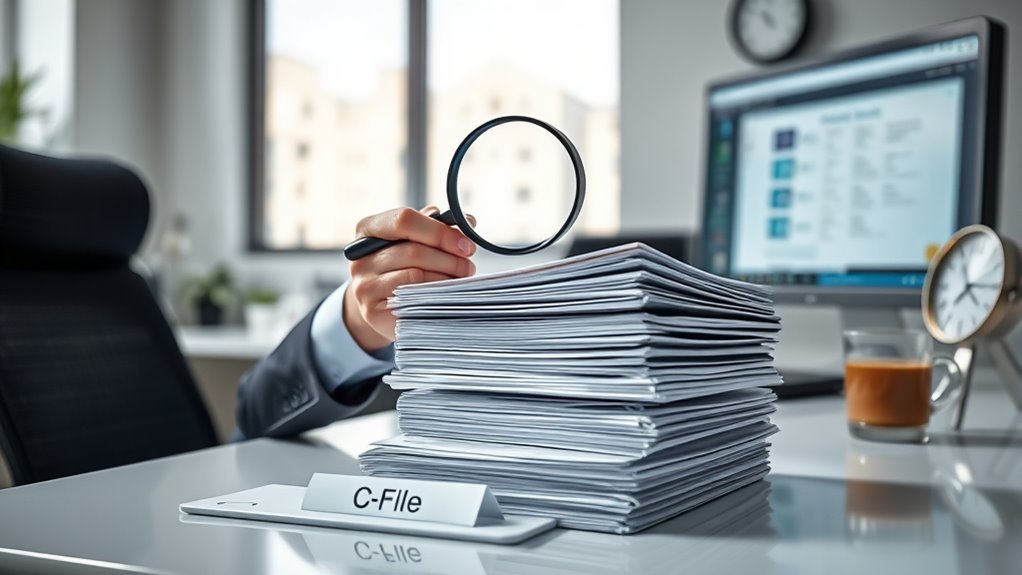Getting your C-file is important because it gives you a clear view of your case, including reports, decisions, and evidence. Reviewing it helps you spot errors, understand your rights, and see if any information is missing or incorrect. Protecting your privacy and knowing what’s in your file can prevent unfair treatment. If you want to learn how to access and use your C-file effectively, there’s more to explore that can empower you further.
Key Takeaways
- Reviewing your C-file reveals inaccuracies, ensuring the case reflects correct and complete information.
- Accessing your C-file helps you understand the evidence and decisions impacting your case.
- Protects your privacy by identifying sensitive information and requesting appropriate redactions.
- Enables you to challenge or correct false or outdated details within your case records.
- Empowers self-advocacy by providing transparency and control over your case documentation.
Understanding What a C-File Contains

A C-file is a thorough collection of documents related to your claim or case, and understanding its contents is essential for managing the process effectively. It includes various records such as medical reports, correspondence, and administrative notes. Be aware that some information within the file may contain confidential information, which is protected by privacy laws. Reviewing these documents helps you understand the evidence and decisions influencing your case. However, you should also be mindful of the legal implications of handling sensitive information. Unauthorized access or disclosure of confidential details could lead to legal consequences. Additionally, the contrast ratio of your projectors significantly impacts image quality, especially in dark scenes. By familiarizing yourself with what’s in your C-file, you gain better control and insight into your case, ensuring you’re prepared for the next steps.
The Benefits of Reviewing Your C-File

Reviewing your C-file offers several key benefits that can substantially impact your case. First, it helps you identify inaccuracies or missing information that could weaken your position. Second, understanding your C‑file privacy and c file confidentiality ensures you’re aware of what information is shared and how it’s protected. Third, it empowers you to spot potential red flags or inconsistencies in the data collected about you. Fourth, familiarizing yourself with your C‑file content gives you leverage to challenge or correct false or outdated details. Fifth, applying knowledge of aviation regulations can help you better interpret the information contained in your file and ensure compliance. Overall, reviewing your C‑file keeps you informed and in control, ensuring your case reflects accurate, private information while safeguarding your c file privacy. This proactive approach can make a significant difference in your legal outcomes.
How to Request Your C-File From Authorities

To request your C-file from authorities, start by identifying the appropriate agency or department that holds your records, such as the police department, immigration office, or relevant agency. Contact them through their official channels, whether online, by mail, or in person. When submitting your request, specify that you want access to your confidential information while emphasizing the importance of data security. Be prepared to verify your identity to protect your confidential information. Some agencies may require a written request or a formal form, so follow their instructions carefully. Keep copies of all correspondence for your records. Ensuring proper handling of your request helps maintain the security of your data and ensures you receive an accurate, unredacted copy of your C-file.
Common Challenges and How to Overcome Them

Obtaining your C-file can sometimes present unexpected hurdles, such as delays, incomplete records, or difficulty verifying your identity. These issues often hinder your document access and raise confidentiality concerns. To overcome them, stay persistent and follow up regularly. Be prepared to provide additional identification if needed, and request clarification on missing or unclear information. Understanding your rights helps you navigate the process more effectively. Additionally, requesting copies of specific documents can clarify what’s available and prevent unnecessary delays. If you encounter confidentiality concerns, ask how your information is protected and whether sensitive details can be redacted. Staying organized and proactive ensures you can access your C-file efficiently and securely.
Using Your C-File to Protect Your Rights

Your C-file is a powerful tool for safeguarding your rights, as it contains detailed records of your case, decisions, and the evidence used. By reviewing it, you can identify any inaccuracies, missing information, or unfair treatments. It’s essential to understand the legal implications of the information within the file, especially regarding confidential information. Protecting this data guarantees your privacy and prevents misuse. If you find sensitive details that shouldn’t be disclosed, you can request corrections or restrict access. Using your C-file effectively helps you challenge incorrect decisions, prepare for hearings, and ensure your rights are upheld throughout the process. Remember, having control over your C-file empowers you to advocate for yourself and maintain transparency in your case. Additionally, understanding privacy policies related to your case information can help you better navigate your rights and data protection options.
Frequently Asked Questions
How Long Does It Typically Take to Receive My C-File?
You might wonder how long it takes to receive your C‑file. Typically, the processing time ranges from a few weeks to a couple of months, depending on the agency. If you need your file quickly, you can request an expedited request, which can markedly reduce wait times. Keep in mind that processing times vary, so it’s best to check with the agency or submit your request early to avoid delays.
Are There Any Costs Associated With Obtaining My C-File?
Think of obtaining your C-file as opening a treasure chest—you might wonder if there’s a cost to unlock it. Usually, there are minimal costs involved, like filing fees or administrative charges, but they vary depending on the agency. Cost considerations are important; some agencies waive fees for certain circumstances. Always check ahead to avoid surprises, ensuring you’re prepared for any associated expenses when retrieving your valuable records.
Can I Request a Copy of My C-File Online?
Yes, you can usually request a copy of your C‑file online through the agency’s digital access portal. This makes the process quicker and more convenient. However, be aware of privacy concerns, as you’ll need to verify your identity to protect your sensitive information. Make sure to review the agency’s security measures and privacy policies before submitting your request online, so your personal data stays safe.
What Should I Do if My C-File Contains Incorrect Information?
Imagine your C-file as a story of your journey, and errors are like misprints that need fixing. If you find incorrect information, you should proactively contact the agency to correct errors and guarantee document accuracy. Provide supporting evidence and clearly explain the issues. Taking these steps helps maintain the integrity of your record, making sure your story accurately reflects your experiences and qualifications.
Are C-Files Available to the Public or Only to Individuals Involved?
You might wonder if C-files are accessible to the public or just to those involved. Generally, C-files are confidential and not available for public access to safeguard individuals’ privacy. Only the person involved, their legal representatives, or authorized agencies can access the information. If you’re seeking your C-file, you’ll need to follow proper procedures to ensure confidentiality is maintained while obtaining your records.
Conclusion
Getting your C-file is like opening a window to your past. It helps you understand what authorities see and gives you the power to stand up for your rights. Don’t wait for issues to arise—being proactive is the key. Remember, knowledge is like a lighthouse in a storm; it guides you safely through uncertain waters. Take control today, and let your C-file illuminate the path to your future.










